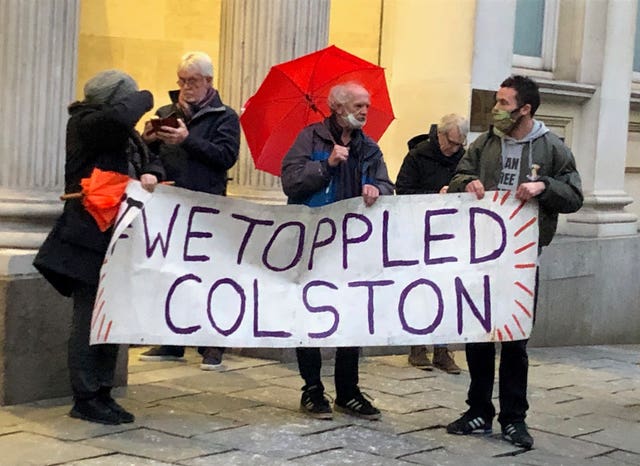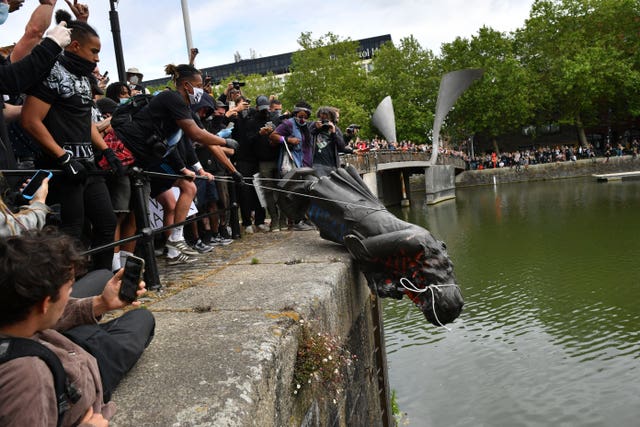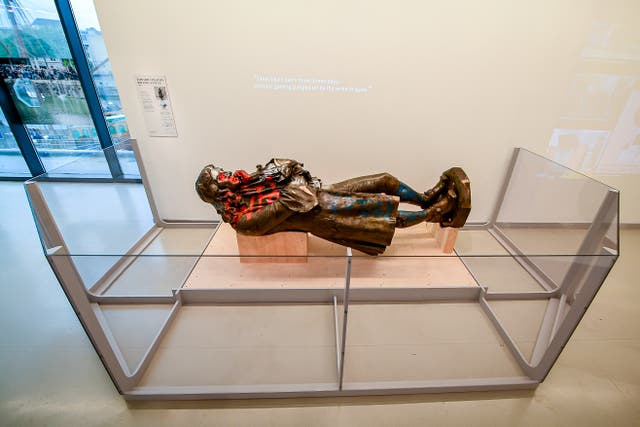
The four people cleared of criminal damage for pulling down the statue of slave trader Edward Colston say their acquittal is “a victory for Bristol”.
The bronze memorial to the 17th century figure was pulled down during a Black Lives Matter protest on June 7 2020, before being rolled into the water.
It became a key moment of the wave of protests seen around the world in the wake of the murder of George Floyd by a police officer in the US, and was even mentioned at Mr Floyd’s funeral.
Rhian Graham, 30, Milo Ponsford, 26, and Sage Willoughby, 22, Jake Skuse, 33, were acquitted of criminal damage on Wednesday following an 11-day trial at Bristol Crown Court.
 People outside Bristol Crown Court (Tess de la Mare/PA)
People outside Bristol Crown Court (Tess de la Mare/PA)
None of the defendants denied their involvement, but claimed that the presence of the statue was a hate crime, and that it was therefore not an offence to remove it.
Ms Graham and Mr Ponsford brought ropes to the scene, while Willoughby climbed the statue to pass the ropes around its neck.
Mr Skuse was accused of goading the crowd into rolling it 500m to the harbour and throwing it in.
A large crowd of supporters attended court every day of the trial, and there was a huge cheer from the public gallery as the not guilty verdicts were returned.
 Protesters throwing a statue of Edward Colston into Bristol harbour (Ben Birchall/PA)
Protesters throwing a statue of Edward Colston into Bristol harbour (Ben Birchall/PA)
Speaking outside of court alongside protestors carrying banners reading “we toppled Colston” and “Glad Colston’s Gone”, Mr Willoughby denied they were trying to edit history.
He said: “We didn’t change history, they were whitewashing history by calling (Colston) a f****** virtuous man – sorry to swear.
“We didn’t change history, we rectified it.”
Mr Willoughby continued: “This is a victory for Bristol, this is a victory for racial equality and it’s a victory for anybody who wants to be on the right side of history.”
Speaking outside of court, Ms Graham said she was “overwhelmed” in the wake of the jury’s verdicts.
She added: “I’m just so overwhelmed, because it never felt like we’ve got we’d get here. We just want to say thank you to so many people because we have never been alone in this journey, we have been so supported and we are such a small part of this really.
“There were so many people that day, and so many people reverberating across the world in response to it.”
After the statue was felled, various monuments to Colston have now been renamed, including a school, a tower block, pub and concert hall.
Ms Graham said: “That is one thing that has been a really big lesson to me, being able to take agency in my own life.
“We all have the ability to say how our space is decorated and who we venerate and who we celebrate and one thing we know now is that Colston does not represent Bristol.”
 The statue of Bristol slave trader Edward Colston (Ben Birchall/PA)
The statue of Bristol slave trader Edward Colston (Ben Birchall/PA)
Some big names lent their support to the defendants, including TV historian and author Professor David Olusoga who gave expert evidence on the history of slavery.
Former Bristol lord mayor Cleo Lake came to court to recount her own struggle to have Colston’s picture removed from her office, while street artist Banksy designed a limited-edition T-shirt to raise funds for the defendants.
During trial, the prosecution said it was “irrelevant” who Colston was, and the case was one of straightforward criminal damage.
Barrister Tom Wainwright, for Mr Ponsford, said the felling of the statue had helped heal the wounds of slavery and accused the prosecution of inviting the jury to “pick open these wounds once more”.
Liam Walker, for Mr Willoughby, told the jury their decision would “reverberate around the world” and urged them “to be on the right side of history”.
In summing up, Judge Peter Blair QC told the jury to disregard such rhetoric about the weight and consequences of their decision, and try the case purely on the evidence in front of them.
Following the verdicts, Chief Superintendent Liz Hughes, head of neighbourhood policing with Avon and Somerset Police, said: “This was an incident which attracted worldwide attention and which polarised public opinion.
“Ultimately, we had a duty to investigate as the custodians of the statue – Bristol City Council – had not granted anyone permission to damage it.
“Following a thorough investigation we submitted a file of evidence to the Crown Prosecution Service who then made the decision to charge the four defendants with criminal damage.
“Having been presented with the evidence, a jury has now determined their actions were not criminal and we respect its decision.”


Comments: Our rules
We want our comments to be a lively and valuable part of our community - a place where readers can debate and engage with the most important local issues. The ability to comment on our stories is a privilege, not a right, however, and that privilege may be withdrawn if it is abused or misused.
Please report any comments that break our rules.
Read the rules hereComments are closed on this article